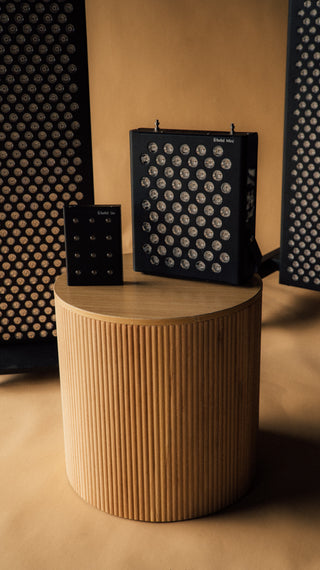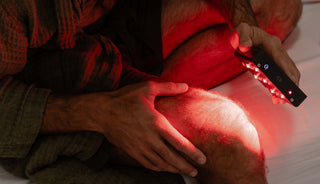We actually also need light on our bodies the same way that we need food for our bodies. Red light can be seen as nutrition for the body.
The body especially needs light at certain wavelengths. Our bodies produce important elements from absorbing specific wavelengths of light. e.g. Vitamin D that our body creates when being in the sun.
Red light and near-infrared enhance the production of important elements like Adenosine Triphosphate (ATP), which enhances energy in our cells and drives many processes in the body. Through using RLT frequently we are able to artificially energise the cells in our body. The benefits of this are enormous and the research is profound.
Skin Exposure
Red light will work most efficiently on bare skin, so we suggest avoiding wearing clothes, towels or make-up. (Thin fabrics are suitable if bare skin is not appropriate.)
Eye Health
Contact lenses should be removed if possible. The LEDs are very bright, therefore we recommend using the provided safety goggles, especially if your eyes are very sensitive to bright light or if you have an eye condition where you need to avoid light exposure. This is particularly true for when near-infrared (NIR) is active, as this is invisible to the naked eye.
Frequency for First-Time Users
We suggest starting with short sessions, particularly when targeting more sensitive areas of the body.
For first-time users, we recommend starting out with 2-3 minute sessions per area, and slowly working up to a 10 minute session (per treatment area) over the course of 2-3 weeks as your body acclimates to the Helsi Red Light.
Standard Use Frequency
We recommend no more than 15 minutes (per treatment area) in any one session, at a distance of 15 - 30 cm from your Helsi red light lamp. The distance from the device will vary depending on the amount of LEDs in the device and their irradiance.
We suggest a minimum of 3 sessions per week. If more than one session per day is required, sessions should be at least 6 hours apart.
In addition, no more than 3 days per week should be skipped in order to maintain the positive effects. If you’re short on time, it’s better to have only one shorter session of a few minutes per day than to have none at all.
Distance From Light
The closer you are, the shorter your session will be, and you'll cover a smaller surface area. If you stand further away, you will be able to cover a larger area but more time will be required.
Helsi would like to remind users that this should not be taken as direct medical advice, and you should always consult a licensed health practitioner before making any significant changes to your lifestyle or existing treatment regimen.



